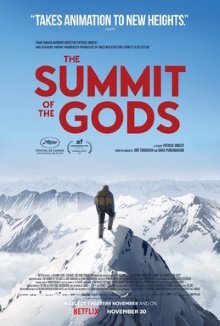Feels like we’ve been watching too many films about mountain climbing recently so I should try to cut down on them. This one at least is a little different being a French language animated film that is an adaptation of a Japanese manga series. As the story is wholly fictional, it is allowed to take a far darker turn than any film about real life climbers who mostly want to be seen as inspirational. So while the characters here are just as obsessed with mountaineering as the real climbers we’ve seen, here it is portrayed almost as a kind of curse and that plus the fact that this one is animated marks it as being different from the other films.
Makoto Fukamachi, a Japanese photojournalist, is frustrated that his latest batch of photos on the slopes of Mount Everest hasn’t turned out that well. While drinking in a bar in Kathmandu, a man tries to sell him a camera that he claims belonged to George Mallory who died while attempting to summit Everest in 1924. He dismisses the man but then outside he sees a large man reclaiming the stolen camera from the seller. He only later realizes that the man was Habu Joji, a famous mountain climber who subsequently disappeared. Back in Japan, Fukamichi pitches to his editor about writing a story about Habu and obtaining the camera that would answer the question of whether or not Mallory made it to the summit before he died. His research leads him to retrace Habu’s mountaineering career. He discovers that Habu was a determined and obsessive climber to the point of alienating everyone else. He also found multiple tragedies across his career including an incident that lead to him losing fingers that makes him so recognizable. Nevertheless, Habu persists in climbing and Fukamichi asks himself what drives a man to such extremes.
George Mallory was obviously a real mountaineer but pretty much everyone else in this story is fictional and the focus is squarely on Habu Joji. The camera is really just a MacGuffin to explain Fukamachi’s motivations. Every film about mountaineering emphasizes the superhuman levels of willpower high altitude climbers must possess. This film however isn’t afraid of taking this to dark extremes. Even early on Habu is dismissive towards the fellow members of his climbing club who he finds to be too amateurish and more interested in being social with each other than in climbing. Inevitably deaths and injuries occur as a result of his expeditions but though he tries to make amends, it doesn’t stop him from going back to the mountains again and again. More notably the film shows Habu failing plenty of times, either at being the first to succeed in a particular challenge or even to reach the summit sometimes. Yet still that doesn’t stop him from going back and after a while he stops caring about being known for breaking records hence why he dropped off the radar.
This being an animated film, its visuals can’t match the grandiose vistas of real life imagery. That said, the illustrations do capture specific details of mountaineering that may be overlooked otherwise. For example, you get a clear idea of the different lengths of rope the climbers use, how they’re attached and their purpose, the types of tools they use, even how they must treat different types of rock and ice surfaces differently. One thing I noted is that as the source material is a Japanese manga and that in turn was inspired by a Japanese novel, all of the climbers in here are Japanese. That feels a little odd as mountaineers are usually a very small and hence multinational community. So when they discuss different climbing milestones, even those in Europe, and the climbers’ names are all Japanese, that feels off to me.
In the end, this film’s insights are brutally honest but not really groundbreaking. It acknowledges that those who have caught the climbing bug are hopelessly addicted and feel compelled to keep climbing despite the risks to themselves and the sacrifices they must make. But the converse side of that is that there is no larger meaning or purpose and it even tells you that there is no point in asking further. It makes it an interesting counterpoint to other climbing films that frame it as a triumph of willpower and discipline and perhaps that is enough to make this worth watching.
